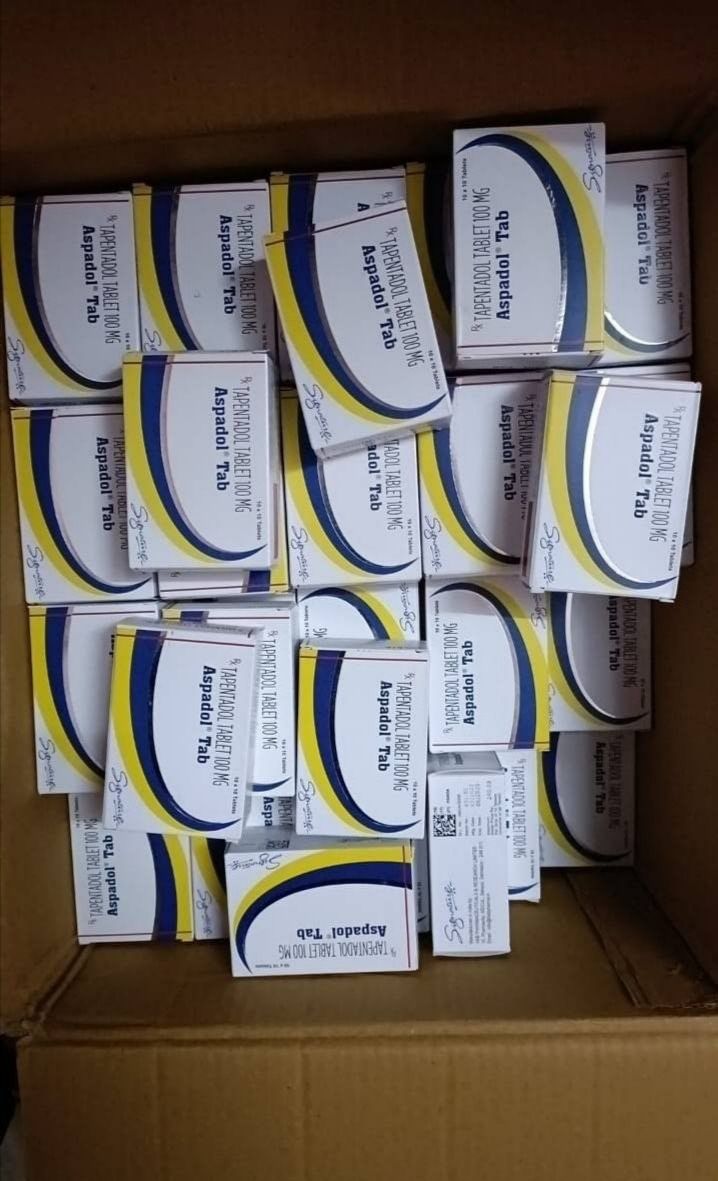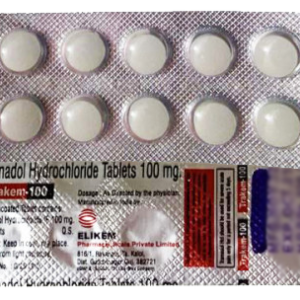Description
Aspadol 100 TABLET contains Tapentadol which belongs to the group of medicines called Opioids. It is used in adults for the management of severe chronic pain which can only be managed by a strong (opioid) painkiller.
TAPENTADOL 100 MGTABLET is not recommended for use in patients having severe kidney or liver problems, asthma or if your breathing is dangerously slow or shallow (respiratory depression, hypercapnia), paralysis of the gut (muscles of the gastrointestinal tract).
TAPENTADOL 100 TABLET should be used with caution in patients who have slow or shallow breathing, increased pressure in the brain, disturbed consciousness up to coma, head injury or brain tumour, pancreatic or biliary tract disease (pancreatitis), increased tendency towards epilepsy, have tendency to abuse medicines (habituating), moderate liver problems, kidney disease and intolerance to certain sugars (such as lactose).
TAPENTADOL 100 MG TABLET is not recommended for use in pregnant women unless recommended by the doctor and it is not recommended for use in breast-feeding women. TAPENTADOL 100 MG TABLET is not recommended for use in children and adolescents (below 18 years of age) and it should be used with caution in elderly patients (aged 65 years of age).
The most common side effects of taking Tapentadol 100 mg TABLET are nausea, constipation, dizziness, drowsiness, headache, decreased appetite, indigestion and flushing. Consult your doctor if any of the side effects worsen.
USES OF TAPAL 100 TABLET
Manages severe chronic pain in adults
HOW TAPAL 100 TABLET WORKS
TAPENTADOL 100 TABLET acts directly on the central nervous system and reduces the feeling of pain by interrupting the way in which pain is signaled between brain and the body. TAPENTADOL 100 TABLET binds with certain receptors called µ-opioid receptors and also increases the release of a nerve chemical called norepinephrine which causes inhibition of certain receptors leading to pain relief.
DIRECTIONS FOR USE
Take TAPENTADOL 100 TABLET as advised by your doctor. Swallow the medicine with a glass of water. Do not crush or chew the medicine. Your doctor will decide the correct dose and duration for you depending upon your age, body weight and disease condition.
SIDE EFFECTS OF TAPENTADOL 100 TABLET
COMMON
Nausea, vomiting
Constipation, diarrhoea, indigestion
Dizziness, drowsiness, headache
Decreased appetite
Anxiety, depressed mood
Sleep problem
Nervousness, restlessness
Disturbance in attention
Trembling, muscle twitches
Flushing
Shortness of breath
Itching, rash
Increased sweating
Feeling of weakness, fatigue
Feeling of body temperature change
Mucosal dryness
Accumulation of water in the tissue
UNCOMMON
Allergic reaction including swelling beneath the skin, hives, and in severe cases difficulty breathing, collapse or shock, a fall in blood pressure
Weight loss
Disorientation, confusion
Excitability (agitation)
Perception disturbances
Abnormal dreams
Euphoric mood (extreme happiness and excitement)
Depressed level of consciousness
Memory or mental impairment
Fainting
Sedation (excessive sleepiness)
Balance disorder
Difficulty in speaking
Numbness, abnormal sensations of the skin such as tingling, prickling
Abnormal vision
Faster or slower heart rate, palpitations, decreased blood pressure
Abdominal discomfort
Hives
Delay in passing urine or frequent urination
Sexual dysfunction
Drug withdrawal syndrome
Feeling abnormal, irritability
RARE
Drug dependence
Thinking abnormal
Epileptic fits
Near fainting
Abnormal coordination
Dangerously slow or shallow breathing (respiratory depression)
Impaired gastric emptying
Feeling drunk
Feeling of relaxation
Stop taking TAPENTADOL 100 TABLET and inform your doctor immediately if you experience any of the following side effects:
Signs of an allergic reaction (such as difficulties in breathing, wheezing, swelling of the eyelids, face or lips, rash or itching (covering your whole body)
Breathing more slowly or weakly than normal
HOW TO MANAGE SIDE EFFECTS
Nausea or vomiting:
Stick to simple meals while taking this medicine. Avoid eating oily rich, fried or spicy foods. Do not lie down or sleep immediately after eating. Consult your doctor if the symptom does not improve.
Constipation:
Eat plenty of fiber rich foods such as fresh fruits, vegetables, and cereals and drink plenty of water. Exercise more regularly (such as daily walk). Consult your doctor if the symptom does not improve.
Diarrhoea:
Drink lot of fluids, such as water to keep yourself hydrated. Avoid eating high-fat or spicy foods. Try to avoid taking any medicine on your own to manage diarrhea and consult your doctor if the symptom gets worse.
Stomach pain:
Try to rest and relax. Eat and drink slowly or try to have smaller meals more frequently. Keep a heat pad on your stomach. If the symptom does not improve, consult your doctor.
Headache:
Drink ample amount of water and avoid skipping meals. Get adequate rest. Try to be relaxed and stress free. Apply pain relieving balm on your forehead if necessary. Consult your doctor if the symptom does not improve.
WARNING & PRECAUTIONS
PREGNANCY
TAPAL 100 TABLET is not recommended for use in pregnant women unless recommended by the doctor as it can cause withdrawal symptoms in the new-born baby when used for prolonged period of time, which might be life threatening and could also possibly lead to dangerously slow or shallow breathing in the newborn. Consult with your doctor before taking TAPENTADOL 100 TABLET.
BREASTFEEDING
TAPENTADOL 100 TABLET is not recommended for use in breastfeeding women as it may pass through the breast milk. Consult your doctor before taking TAPENTADOL 100 TABLET.
DRIVING AND USING MACHINES
Do not drive or use any machinery while taking TAPENTADOL 100 TABLET if you experience drowsiness, dizziness, blurred vision or impairment of reactions.
ALCOHOL
Avoid consumption of alcohol while taking Tapentadol 100 TABLET as it may increase the effect of drowsiness.
KIDNEY
TAENTADOLL 100 TABLET is not recommended for use in patients with severe kidney problems. It should be used with caution in patients suffering from kidney disease. Consult your doctor before taking TAPENTADOL 100 TABLET.
LIVER
Tapentadol 100 TABLET is not recommended for use in patients with severe liver problems. TAPAL 100 TABLET should be used with caution in patients with moderate liver problems and your doctor may adjust the dose. Consult your doctor before taking TAPAL 100 TABLET.
ALLERGY
Do not take Tapentadol 100 TABLET if you are allergic to Tapentadol or any other ingredients of this medicine.
LUNGS
Tapentadol 100 TABLET is not recommended for use in patients having lung diseases such as asthma or dangerously slow and shallow breathing (hypercapnia, respiratory depression). It should be used with caution in patients having other breathing issues (slow or shallow breathing). Consult your doctor before taking Tapentadol 100 TABLET.
OTHERS
Tapentadol 100 TABLET is not recommended for use if you:
Have paralysis of the gut (muscles of the gastrointestinal tract)
Have acute poisoning of alcohol, sleeping pills, pain relievers or other psychotropic medicines (medicines that affect mood and emotions)
Before taking Tapentadol 100 TABLET inform your doctor if you:
Have increased pressure in the brain or disturbed consciousness up to coma
Had a head injury or brain tumour
Have a disease affecting the pancreas (such as pancreatitis) or biliary tract
Have tendency towards fits
Have tendency to abuse medicines (getting habitual of it)
Have lactose intolerance
Use in paediatrics:
Tapentadol 100 TABLET is not recommended for use in children and adolescents (below 18 years of age). Consult your child’s doctor for advice.
Use in geriatrics:
Tapentadol 100 TABLET should be used with caution in elderly patients (aged 65 years and above) due to delayed excretion of this medicine in this age group and your doctor may adjust the dose. Consult your doctor before taking Tapentadol 100 TABLET.
INTERACTIONS
A. Drug–Drug Interactions:
Before taking Tapentadol 100 TABLET inform your doctor if you are taking any of the following medicines:
Sedatives such as zolpidem, barbiturates (Ex. amobarbital, pentobarbital) antidepressants such as paroxetine, sertraline and anti-psychotics such as loxapine, clozapine, monoamine oxidase inhibitors (MAOIs) such as isocarboxazid (used to manage depression, anxiety, mood disorders, sleep disturbances)
Opioids such as codeine, oxymorphone, mixed mu-opioid agonist/antagonists such as pentazocine, nalbuphine, partial mu-opioid agonists such as buprenorphine (used to manage severe pain)
Antihistamines such as cetirizine, loratadine (used to manage allergy)
Rifampicin (used to manage tuberculosis)
St. john’s wort (herbal medicine used to manage depression)
Overdosage:
If you or anyone else accidentally takes too much of Tapentadol 100 TABLET, consult your doctor immediately or visit the nearby hospital. Overdosage symptoms of Tapentadol 100 TABLET are pin-point pupils, vomiting, fast heartbeat, drop in blood pressure, collapse, disturbed consciousness or coma (deep unconsciousness), epileptic fits (convulsions), dangerously slow or shallow breathing or stopping breathing may occur.
SYNOPSIS
Drug :
Tapentadol
Pharmacological Category :
mu-opioid agonists
Therapeutic Indication :
Severe chronic pain
Dosage Forms :
Tablet, Nasal Spray, Capsule
MORE INFORMATION
Keep Tapentadol 100 TABLET out of reach of children
Store at room temperature below 25°C
FAQs ABOUT Tapentadol 100 TABLET
What is Tapentadol 100 TABLET and why is it prescribed?
Tapentadol 100 TABLET contains Tapentadol which belongs to the group of medicines called Opioids. It is used in the management of severe chronic pain in adults which can only be managed by a strong (opioid) painkiller.
Is Tapentadol 100 TABLET a habit-forming medicine?
Tapentadol 100 TABLET may cause psychological and physical addiction. If you have a tendency to become habitual to medicines or if you are dependent on medicines, you should only take Tapentadol 100 TABLET for short periods. You must consult with your doctor priorly and discuss with them.
Can Tapentadol 100 TABLET cause sleep related breathing problems?
Tapentadol 100 TABLET contains an active substance that belongs to the group of opioids which can cause sleep related breathing disorders. This includes central sleep apnoea (shallow, pause of breathing during sleep) and sleep-related hypoxemia (lowered levels of oxygen in the blood). The risk of experiencing such problems depends upon the dose of Tapentadol 100 TABLET. Hence, you should not exceed the daily recommended dose. Your doctor may consider altering your dosage if you experience any such problems.
Can I stop taking Tapentadol 100 TABLET on my own if I start to feel better?
You must not stop taking Tapentadol 100 TABLET until and unless your doctor asks you to stop. Stopping suddenly or too soon may cause your pain to return. If you have been taking Tapentadol 100 TABLET for quite some time and you stop suddenly, you may experience symptoms such as restlessness, runny nose, yawning, watery eyes, sweating, chills, muscle pain, joint pain, dilated pupils, irritability, anxiety, backache, weakness, abdominal cramps, etc. If you feel any such symptoms or at all you wish to discontinue taking Tapentadol 100 TABLET, ask for your doctor’s advice.
Does Tapentadol 100 TABLET affect my ability to drive?
Do not drive or use any machinery if you feel drowsy, dizzy, blurring of vision or impairment of concentration after taking Tapentadol 100 TABLET. You can resume with your activities once you feel normal again. Consult your doctor for advice.





Reviews
There are no reviews yet.